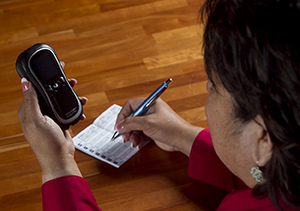Diabetic Retinopathy: Controlling Your Risk Factors
Diabetic retinopathy affects your eyes. It happens when diabetes harms blood vessels in the back of the eye. This part of the eye is called the retina. Problems in the retina can lead to vision loss. Take care of your general health. This will help to reduce your risk of vision loss. If you manage your diabetes and other health problems, this eye condition may be less likely to occur. It is also important to be looked at by an eye care provider about once a year. Or as advised. They will do a dilated eye exam. This is done to check the back of the eye. It helps to find any problems with the blood vessels of your retina.
Manage your diabetes
 |
| As often as possible, keep your blood sugar in the target range. |
Help protect your sight by:
-
Keeping your blood sugar level in a healthy range
-
Checking your blood sugar often
-
Following your diabetes management plan
-
Exercising carefully. This will prevent you from putting extra pressure on the blood vessels in the back of your eye.
-
Working closely with your healthcare providers. They can help if you can't keep your blood sugar in range. These may include a provider whose special area of medicine is diabetes (endocrinologist). They could be a primary care provider. Or any other healthcare provider who helps to manage your diabetes.
Control your risk factors
There are other factors that harm blood vessels. These can make diabetic retinopathy worse. These factors include:
Work with your healthcare team to control these problems. This can help lower your risk of diabetic retinopathy. A diabetes educator can also help. They can help you control blood pressure. And high cholesterol. And they can tell you about programs to help you to quit smoking. It's also important to be looked at by an eye care provider once a year, or as advised.. This is important even if your sight seems fine.
To learn more
The resources below can help you learn more:
© 2000-2025 The StayWell Company, LLC. All rights reserved. This information is not intended as a substitute for professional medical care. Always follow your healthcare professional's instructions.